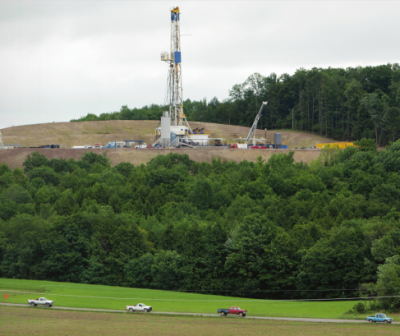The Fractured Debate - Fracking in PA
 No matter which way you drill down, the controversial process of fracking is part of the national lexicon.
No matter which way you drill down, the controversial process of fracking is part of the national lexicon.
This spring, 18 Lehigh University professors from six departments spanning three colleges took a field trip to the center of shale gas mining in Pennsylvania, one of America’s shale gas hotspots. First they visited a well pad in Bradford County, which leads the state in issuing permits for extracting shale gas with blasts of chemicals, sand and water—a process called hydraulic fracturing, or fracking. Then they visited a plant for recycling fracked water in nearby Lycoming County, a new boomtown for shale gas subsidiaries.
One sight surprised Alec Bodzin, an associate professor in the College of Education’s teaching, learning and technology program and a faculty member in Lehigh’s Environmental Initiative. He just couldn’t believe the chronic rush-hour traffic of trucks carrying water to and from the fracking sites. Without pipelines or pumping stations, heavy-duty vehicles have to haul three million gallons of water per well, a massive procedure and procession that severely stresses rural roads and municipal road crews.
For Bodzin, the phenomenon solidified his belief that trucking is a key to understanding, and teaching, the fractured debate over fracking. His environmental studies students learn that while trucks damage roads and pollute the air, they also provide jobs and stimulate depressed local economies. Future science teachers, he insists, need to provide a fair, objective assessment of a highly complex, highly charged issue to middle and high schoolers, particularly those with parents directly affected by fracking.
“The shale gas train is rolling and won’t stop,” says Bodzin. “As a society we need to do our homework and make informed decisions. We shouldn’t just jump on the bandwagon for the economy or the environment.”
Understanding the Controversy
The field trip capped Lehigh’s 2011-2012 exploration of the vast, increasingly valuable rock formation known as the Marcellus Shale. A black shale formation rich with natural gas, Marcellus Shale runs from Ohio and West Virginia northeast into Pennsylvania and southern New York. The fracking process used to extract the gas was discussed in panel discussions throughout the year, one of which was moderated by Bodzin, and in courses ranging from Bodzin’s Environmental Education to environmental engineering’s Risk Assessment.
Lehigh presented its Marcellus Shale initiative during a political tsunami. In February, Pennsylvania Governor Tom Corbett signed Act 13, which permits most oil and gas operations in all the state’s zoning districts, including ones with schools, parks and hospitals. In April, President Barack Obama authorized the creation of a high-level federal agency to coordinate shale gas production, a rapidly growing industry likened to a 21st-century gold rush. Indeed, over the next two decades more than 50,000 fracking wells are expected to open in Pennsylvania alone.
—By Geoff Gehman. Excerpted from the 2012 issue of Theory to Practice.